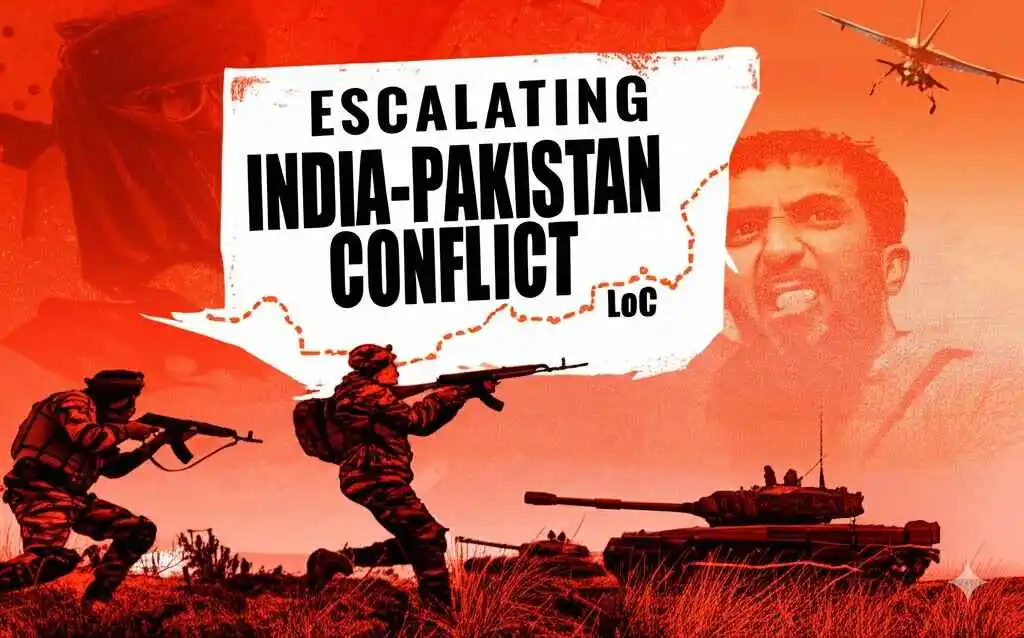As the countdown to conflict continues, several key figures in Pakistan’s terrorist networks—Maulana Munir, Hafiz Saeed, and Azhar Masood—have disappeared from public view. Once outspoken advocates of violence, these figures are now in hiding, driven underground by the escalating threat of retaliation. This shift marks a significant development in the ongoing tension between India and Pakistan, signaling a new and more dangerous phase in the regional conflict.
Pakistan’s Military Provides Shelter to Terrorist Leaders
Reports have surfaced that Pakistan’s military is playing a crucial role in protecting these terrorists, moving them to secure, undisclosed locations. Safe houses and bunkers under the control of Pakistan’s Inter-Services Intelligence (ISI) are reportedly being used to shield the individuals responsible for planning and executing attacks. Despite mounting international pressure, this ongoing sheltering underscores Pakistan’s commitment to maintaining its support for extremist groups, complicating efforts for regional peace and stability.
Disturbing Rhetoric: Pakistan’s Dangerous Glorification of Terrorism
Adding to the growing concerns, Pakistan’s leadership, including the Deputy Prime Minister, has openly referred to the perpetrators of the Pahalgam attack as “freedom fighters,” suggesting that the country should be grateful to those responsible for the death of 28 people. This rhetoric, disturbingly common among Pakistan’s top officials, not only legitimizes violent extremism but also calls into question Pakistan’s commitment to combating terrorism. By framing these attacks as acts of liberation, Pakistan continues to perpetuate a dangerous narrative that undermines peace efforts and fosters an environment where terrorism is excused or even celebrated.
A Longstanding Admission: Pakistan’s Role in Fostering Terrorism
In a striking admission, Pakistan’s Defense Minister Khawaja confirmed what many had long suspected—that for over three decades, Pakistan has actively nurtured and supported terrorist networks. This acknowledgment sheds light on the deep-seated role Pakistan has played in fueling regional instability and its willingness to protect those who perpetrate violence. This public recognition complicates diplomatic relations with India and the international community, highlighting the stark divide in how the two nations view terrorism.
Fierce Clashes Along the Line of Control: India Responds with Strength
As violence intensifies along the Line of Control (LoC), India has decisively responded to Pakistan’s latest provocations. Following an initial round of gunfire from Pakistani soldiers, India launched a retaliatory strike that left four Pakistani soldiers dead. This exchange, though part of a broader pattern of border skirmishes, marks a more assertive stance from India. It signals a shift from passive defense to active retaliation, as India reaffirms its commitment to defending its borders and responding robustly to Pakistan’s violations.
Pakistan’s Military in Disarray: Soldiers Abandon Forward Posts
The ongoing military clashes are not just affecting the battlefield but also the morale of Pakistan’s forces. Reports indicate that Pakistani soldiers are retreating from forward posts along the LoC, driven by fear of India’s more aggressive response. This disorder within Pakistan’s military ranks highlights the effectiveness of India’s countermeasures and raises serious questions about the operational readiness of Pakistan’s forces in the face of sustained Indian pressure.

India’s Strategic Water Measures: Diplomatic and Tactical Leverage
In a move that could further escalate tensions, India is preparing to implement measures to limit Pakistan’s access to water from the Indus River System. A high-level meeting today will discuss potential steps to restrict the flow of water to Pakistan from crucial rivers like the Jhelum and Chenab. This action, which could have devastating consequences for Pakistan’s agriculture and daily life, serves as a potent diplomatic lever. India’s growing use of water resources as a strategic tool underscores the shifting dynamics in the region and adds a new layer to the already complex conflict.
Indian Forces Strike Back: Key Terrorists Eliminated in Kashmir
On the ground in Kashmir, India continues its operations against terrorist groups, with significant success. A recent joint operation between the Indian Army and local police resulted in the elimination of a key Lashkar-e-Taiba terrorist involved in recent attacks. This move follows a broader strategy aimed at dismantling terrorist networks operating within the region, demonstrating India’s commitment to eradicating extremism at its roots.
The Volatile Future of India-Pakistan Relations
With both sides engaging in heavy military action and diplomatic talks reaching a boiling point, the future of India-Pakistan relations looks increasingly uncertain. As tensions flare, India’s response to Pakistan’s ongoing support for terrorism is becoming clearer and more forceful. What began as a series of skirmishes has now escalated into full-scale military operations, and the regional stability hangs in the balance. The situation is rapidly evolving, and the international community is closely watching to see whether these tensions will lead to a larger, more destructive conflict or whether there remains a chance for de-escalation.
The coming days will likely determine the next chapter in this deeply entrenched conflict, with the potential to reshape the geopolitical landscape of South Asia.